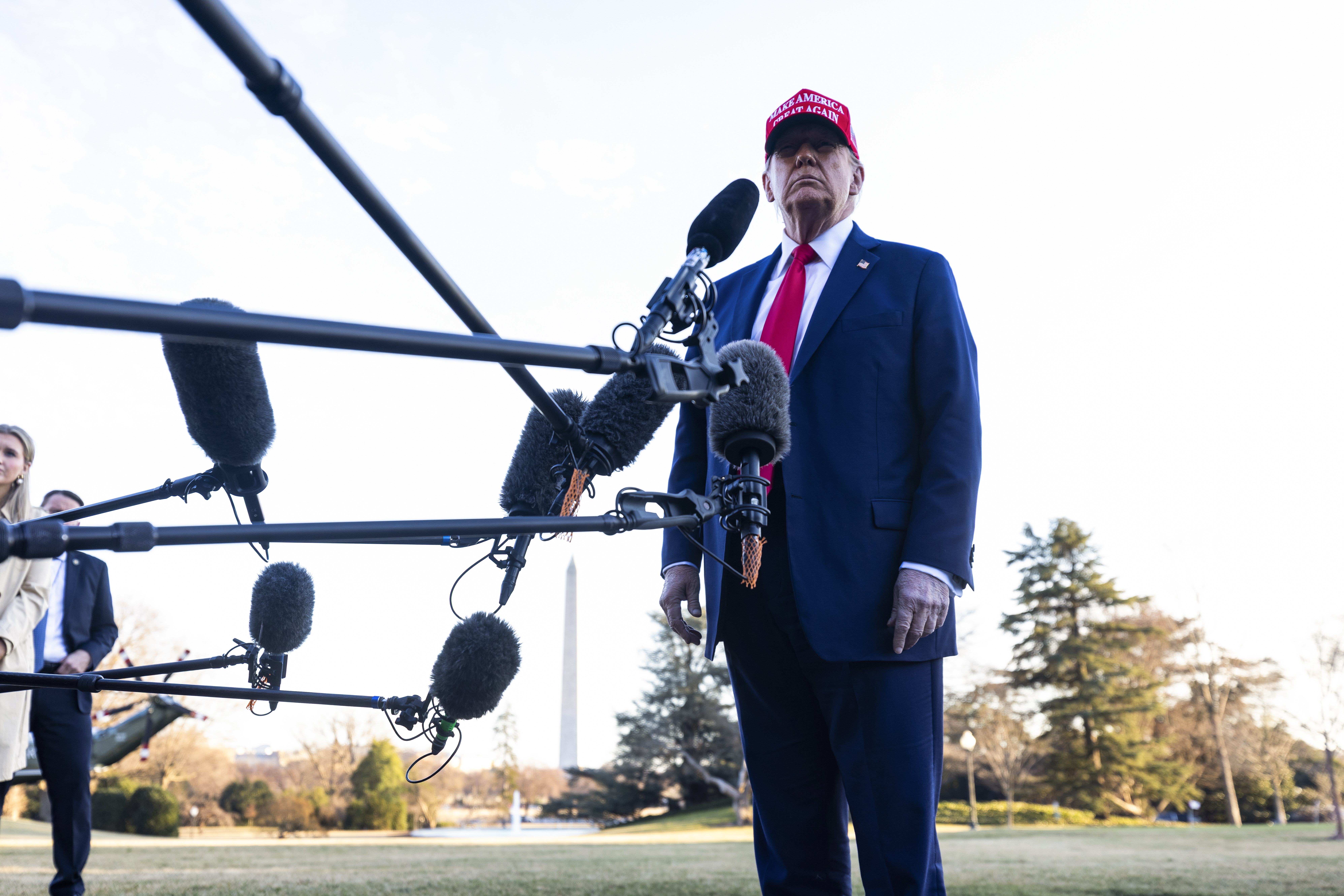How Trump’s Erratic Trade Policies Pose a Threat to Economic Growth
In recent weeks, both consumer and corporate optimism have diminished as markets grapple with the potential impacts of Trump's agenda.

Trump’s erratic trade policy, characterized by sweeping announcements about universal tariffs followed by delays, exemptions, and reversals, has made it difficult for businesses to plan ahead in the early days of his administration. Despite his assurances to foster an environment that would benefit private businesses, the uncertainty from his various tariff declarations could threaten investment crucial for economic growth.
The private sector saw a sharp decline in hiring last month, with many businesses pointing to unpredictable policies as obstacles to growth, according to a widely followed survey released Wednesday. Major Wall Street banks, including JPMorgan Chase and Goldman Sachs, are increasingly predicting that the U.S. might slide into a recession within the next year. Additionally, businesses in New York and New Jersey expect prices to rise by as much as 4 percent over the coming year, according to the Federal Reserve Bank of New York. The Fed’s regional banks noted that trade policy is contributing to economic uncertainty nationwide.
“It’s not just the broad fear of tariffs; it’s not knowing if they’ll be affected, how they’ll be affected, or when they'll be affected,” stated Gregory Daco, chief economist at the global consulting firm EY Parthenon. “That’s the gist of the conversations we have with clients across multiple sectors: they don’t know how to best position themselves with regard to the latent uncertainty about tariffs moving forward.”
Daco emphasized that Trump’s “‘move fast and break things’ approach is hindering that very investment.”
Having secured his second term with commitments to invigorate domestic industries and raise wages, an economic downturn could present significant political challenges for his administration, which aims for a comprehensive overhaul of the federal government and economic policy. The president is acutely aware of financial markets, and high-ranking officials, such as Treasury Secretary Scott Bessent, stress the need to foster corporate investment and “re-privatize” the economy.
However, achieving that goal relies heavily on consumer and corporate optimism, which has waned in recent weeks as markets grapple with potential repercussions of Trump’s policies.
“The administration wants higher growth because animal spirits are unleashed,” remarked Rebecca Patterson, a senior fellow at the Council on Foreign Relations and former chief investment strategist at the hedge fund Bridgewater Associates. “But how do you get more animal spirits — more mergers and IPOs — if there’s uncertainty around market and economic conditions? That seems contradictory.”
On the heels of initiating an unprecedented trade conflict with Canada and Mexico—America’s top two trading partners—the White House announced temporary exemptions for domestic automakers reliant on foreign imports. This policy reversal mirrors a previous change made last month, when Trump reintroduced duty-free treatment for low-cost goods from China.
Even members of his administration have started to moderate their short-term economic expectations. While the labor market appears robust by historical measures, Bessent indicated last week that Biden-era policies have pushed parts of the private sector into recession. Trump himself has acknowledged that tariffs could disrupt economic stability.
“There’ll be a little disturbance, but we’re okay with that. It won’t be much,” he told lawmakers during his joint address to Congress on Tuesday night.
Press Secretary Karoline Leavitt conveyed to reporters that Trump was “being frank and honest” regarding the short-term impacts of his trade strategy.
“The American people elected this president to have monumental reform and change, including rebuilding our manufacturing base in this country, standing up to foreign nations who have been ripping off our country for decades,” she noted. “That requires a little bit of disruption, that requires a lot of effort and work that this president is focused on doing.”
Importantly, many indications that the economy might be hitting a turning point due to tariff-related uncertainty are predominantly reflected in surveys rather than in “hard” data that typically portray official economic activity or payroll growth.
The Labor Department is set to release its monthly jobs report for February, and economists anticipate it will show a solid increase in nonfarm payrolls, with a median estimate of 170,000, while unemployment is expected to remain steady at 4 percent. The ISM Services Index for February, which monitors activity in sectors such as finance and hospitality, exceeded expectations on Wednesday, suggesting that many companies are still hiring.
Nevertheless, rising prices — or even just the expectation of them — resulting from tariffs could press Federal Reserve Chair Jerome Powell to maintain higher borrowing costs for longer, constraining small and mid-market businesses' capacities to invest in new projects or hiring. New York Fed President John Williams indicated on Tuesday that tariff-related unpredictability could lead to price increases and hinder investment activities in the coming months.
“The biggest constraint on small businesses is the level of financing. It is not, you know, animal spirits,” explained Brij Khurana, a fixed-income portfolio manager at Wellington Management. “If we are in a higher inflationary environment, and there are fewer Fed cuts than we anticipated a few months ago, small businesses won't be hiring as much as we had thought.”
Jessica Kline for TROIB News
Find more stories on Business, Economy and Finance in TROIB business












